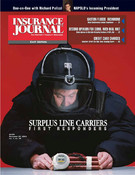The following article is part three of a three-part commentary written by an insurance company executive which includes an industry critique and reflection on lifelong lessons learned. Part one and two appeared in the Aug. 9 and Aug. 23 issues of Insurance Journal magazine.
More about underwriting erosions
The issue that really needs to be addressed is what has been done to the underwriter resource in our industry? Most CEOs (CFOs) view the industry as a financial business. Evaluations focus on surplus, assets, growth and profit. The problem is not in these areas—they are results.
I believe there has been a vast erosion of personnel in our business via reorganization, early retirements, poor performance and lack of training. Every day, fewer people remain available, encouraged and supported to deal with insurance issues. Human erosion, once begun, is very hard to reverse. The future results of a company that does not address this problem can be predicted very early—financial returns well below industry average in good and bad times. Every company will get exactly what it creates and supports, whether or not that is what it wants. “Have you noticed that?”
More about the cycle
Every time the cycle turns from a soft to hard market, underwriters receive strong signals from the home office to “get back to underwriting” and the results invariably improve.
To quote one of the well-known rating agencies: “The industry has successfully shifted its focus toward restoring its underwriting discipline following a strong period of growth and a period of weak profitability.”
Unfortunately, rate levels always rise at the same time. It is impossible to tell how much of the recovery is based on rates, and how much is based on application of underwriting skill. Take your pick—perhaps both! Underwriting cannot go to the financial wizards and present the savings that will result in a certain level of investment in underwriting. In the same manner, there is really no way to keep a specific cost benefit scorecard on a teacher, a doctor, a lawyer or an accountant. “Have you noticed that?”
We really need to question the caliber of many people making underwriting, financial and marketing decisions. This also applies at the desk level. In fact, it applies to all levels. Ask any regulator or reinsurance consultant—they too have seen it all!
Here is a fairly common scenario: When loss ratio goes up, the first strategy is to fix expenses. There certainly is nothing wrong with expense control—it is a critical part of any business. There is nothing wrong with improving efficiency, cost of distribution and the way things are being done. Some of this we try to fix with automation, which frequently doesn’t work very well either.
If a company already has people and systems problems and continues to press expenses in an indiscriminate manner, the problem will simply be compounded. There is going to be a cut in training programs and will force senior high salary personnel out. This makes the ability to correct problems appear nearly impossible. In this environment, CEOs must confront the doctrine of upward communication and face the truth, or consequences. “Have you noticed that?”
Finally, a short note on vision
Insurance companies are almost unique by having the ability to service customers based upon the experience of others, and are also remarkable for their apparent disinclination to do so.
How is a company to achieve the greatest retention rate and quality business? First, to your customers, your employees are the company. Second, customers want more than just efficient workers. Your customers do not want to hear, “Your call is important to me … but I’m not available right now.” Beware of technology that allows the employee to hide out, or to avoid the customer! Third, treat your employees like company and your employees will treat your customers like company and your customers will treat your company like company. For some, it is very difficult to understand this simple truth.
Your competitors will wonder how you were able to achieve such success with products very similar to their own.
Conclusion
What does this all really mean?
There is something fundamentally wrong with the insurance business if the results of the last 25 years are an indication. I do not believe this can be easily dismissed. To be successful the industry/company needs to spend more time keeping its house in order rather than blaming their woes on other people or things (i.e., inflation, reserves, regulation, insurance commissioners, trade associations, lawyers, etc.).
Knowledge, not automated systems and products, is now the most valuable commodity. Unfortunately, most of us have failed to recognize this fact and will pay dearly in the future. I have observed senior managers stumble over this truth from time to time, and then pick themselves up as if nothing happened.
Individual risk underwriting can survive only if the industry/company works at it and provides better support to the profession today. I believe the art of underwriting has been misplaced rather than lost.
The paradox of growth and profit can be managed with the help of upward communication, a dimension of corporate life often ignored by senior managers. There is a need to be straight forward with middle managers about the economics of the business and what they need to do to weather the insurance cycle.
It has been the inaction of those who could have acted, the indifference of those who should have known better, and the silent voice of senior management when it mattered most that has led to the negative results of all insurance cycles.
With the help of regulators, we have lost our calling to use our knowledge/expertise to prevent human and property losses. We need to restore present solutions such as those now being developed by the Institute for Business and Home Safety (IBHS), and we need to implement them and share them.
The great secret of success in the insurance world is that there are no secrets of success. There are only timeless principles that have proven effective since the first insurance policy was issued, which may have simply been disregarded. Frankly, the industry/company has abandoned some of the time-honored insurance principles, which have been proven lessons during the difficulties of past cycles.
Only a small group of companies will be consistently successful by not yielding to these temptations. The main difficulty is the rising generation of new managers never knowing much about the previous one. Most think it is too much to find out. Why is it every generation of new managers views itself to be more intelligent than the one that went before it? “Have you noticed that?”
So, it seems in this business of deep English tradition the industry/company will get what it creates and supports, whether or not that is what it wants or expects. You will notice that!
Recently a national consumer organization said its research has determined that the high priced market has come to an end. Once in a while, it strikes some companies that they don’t have to live by the insurance cycle. What will you choose to do? Ride the cycle, manage the paradox, commit to underwriting, reorganize … or not? It is much more than “getting back to basics.”
Wallace H. Smith joined National Grange Mutual in 1986 as underwriting vice president. He now serves as assistant underwriting vice president, corporate underwriting. His expected retirement date is Dec. 31, 2004.
Topics Underwriting
Was this article valuable?
Here are more articles you may enjoy.


 Resilience: Cyber Risk Shifts From Disruption to Long-Tail Losses
Resilience: Cyber Risk Shifts From Disruption to Long-Tail Losses  Meta Loses Insurance for Defense in Major Social Media Addiction Litigation
Meta Loses Insurance for Defense in Major Social Media Addiction Litigation  State Farm Inked $1.5B Underwriting Profit for 2025 but HO Loss Persists
State Farm Inked $1.5B Underwriting Profit for 2025 but HO Loss Persists  Cuts to Funding Mean Risks Will Pivot in Human Services Market
Cuts to Funding Mean Risks Will Pivot in Human Services Market 


